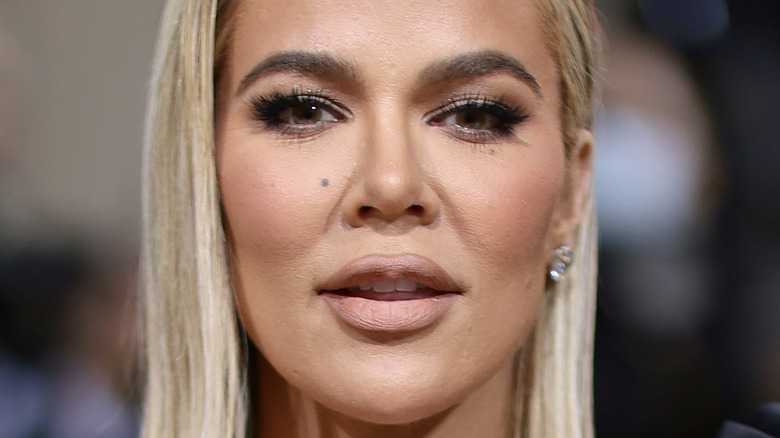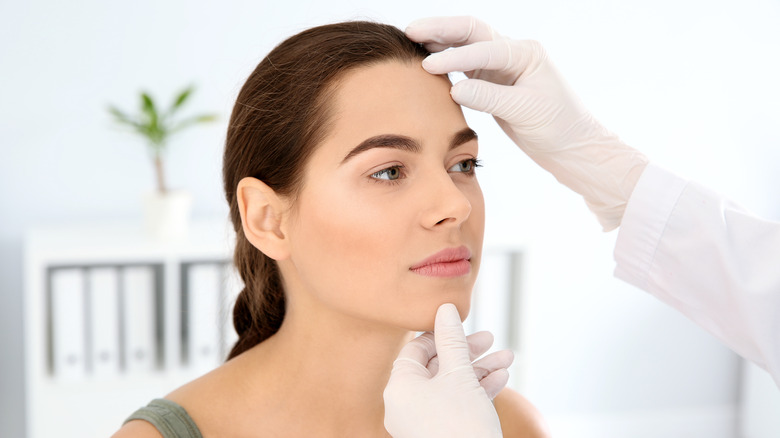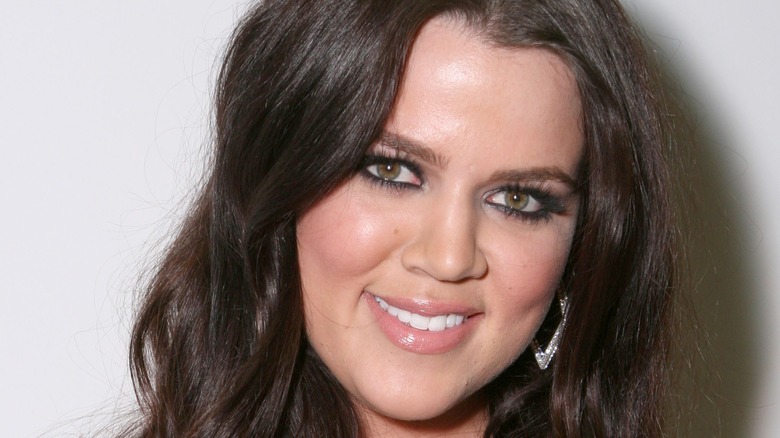Celebrity Dermatologist Unpacks Khloé Kardashian's Skin Cancer Scare – Exclusive
A day doesn't go by without reading about the Kardashians on the news. Love them or hate them, you want to know what's going on in their lives, whether it be their juicy relationship drama, their adorable children, or their mega-successful business ventures.
Khloé Kardashian has been chiefly in the news for her messy relationship with Tristan Thompson. However, her most recent news is about skin cancer, as the reality star was seen with a bandage on her cheek. Before the rumor mill went out of control, Kardashian shared her experience in her Instagram stories on October 11. She revealed in her stories that she recently underwent a procedure to remove the tumor from her face after seeing two dermatologists and having two biopsies, per E! Online. Kardashian wrote, "After noticing a small bump on my face and assuming it was something as minor as a zit, I decided to get it biopsied 7 months after realizing it was not budging."
According to the Skin Cancer Foundation, skin cancer is the most common cancer in the world, and every hour more than two people die from it. By age 70, 20% of Americans will develop skin cancer. The sun's UV rays and UV tanning beds are the two leading causes, and there are four main types of skin cancer: basal cell carcinoma, squamous cell carcinoma, melanoma, and Merkel cell carcinoma.
Celebrity dermatologist breaks down Khloé Kardashian's skin cancer diagnosis
Celebrity dermatologist Dr. Karan Lal spoke exclusively with The List to tell us more about Khloé Kardashian's health scare and the importance of early diagnosis.
Dr. Lal told The List, "It is unclear what the true diagnosis Khloé has but based on the story (non-healing zit-like bump), she may have had basal cell skin cancer. This is the most common type of skin cancer and occurs after long-term chronic sun exposure. It is most common on the face." The Skin Cancer Foundation describes basal cell carcinomas (BCCs) as "abnormal, uncontrolled growths that arise from the skin's basal cells in the outermost layer of skin (epidermis)."
Dr. Lal told us, "Basal cell carcinomas are highly treatable, with over a 99% cure rate with a procedure known as Mohs surgery. During this type of surgery, the dermatologist removes the skin cancer until it is completely out and can confirm its cure in real-time." Dr. Lal added that actor Hugh Jackman also had basal cell skin cancer.
"Unfortunately, Khloé and Hugh are both more likely than not to get more skin cancers," he added. You can blame intense childhood UV exposure and chronic sun exposure over many years for this. According to Dr. Lal, 35-50% of people diagnosed with 1 basal cell carcinoma will develop new skin cancer within five years.
This isn't the first time Khloé Kardashian got skin cancer
If you have had skin cancer, it can come back again. Khloé Kardashian is an example. Celebrity dermatologist Dr. Karan Lal told The List, "She has had a melanoma on the back in her teens, so she has risk factors for developing skin cancers." And this year, she had another scare.
The Good American founder shared the history of her skin cancer on her Instagram stories and wrote, "At 19 years old, I had melanoma on my back, and I had a surgery to remove that as well, so I am pre-composed to melanoma. Even those who are not, we should be checking all the time."
Melanoma is another type of skin cancer that develops from the skin cells called melanocytes responsible for giving skin its color, per the Skin Cancer Foundation. It often looks like moles or progresses from them and can also appear on unexposed body parts too, as tanning beds and UV rays cause this form of cancer. Seeing a dermatologist is essential as early detection can save lives, because melanoma's five-year survival rate is 99%.
If you have a history of skin cancer diagnosis, your risk for developing in the future increases; therefore, Dr. Lal advises, "This is why we closely monitor patients with a history of skin cancer every six months. Adults over the age of 18 with a history of sun exposure should obtain a yearly skin exam by a board-certified dermatologist."


